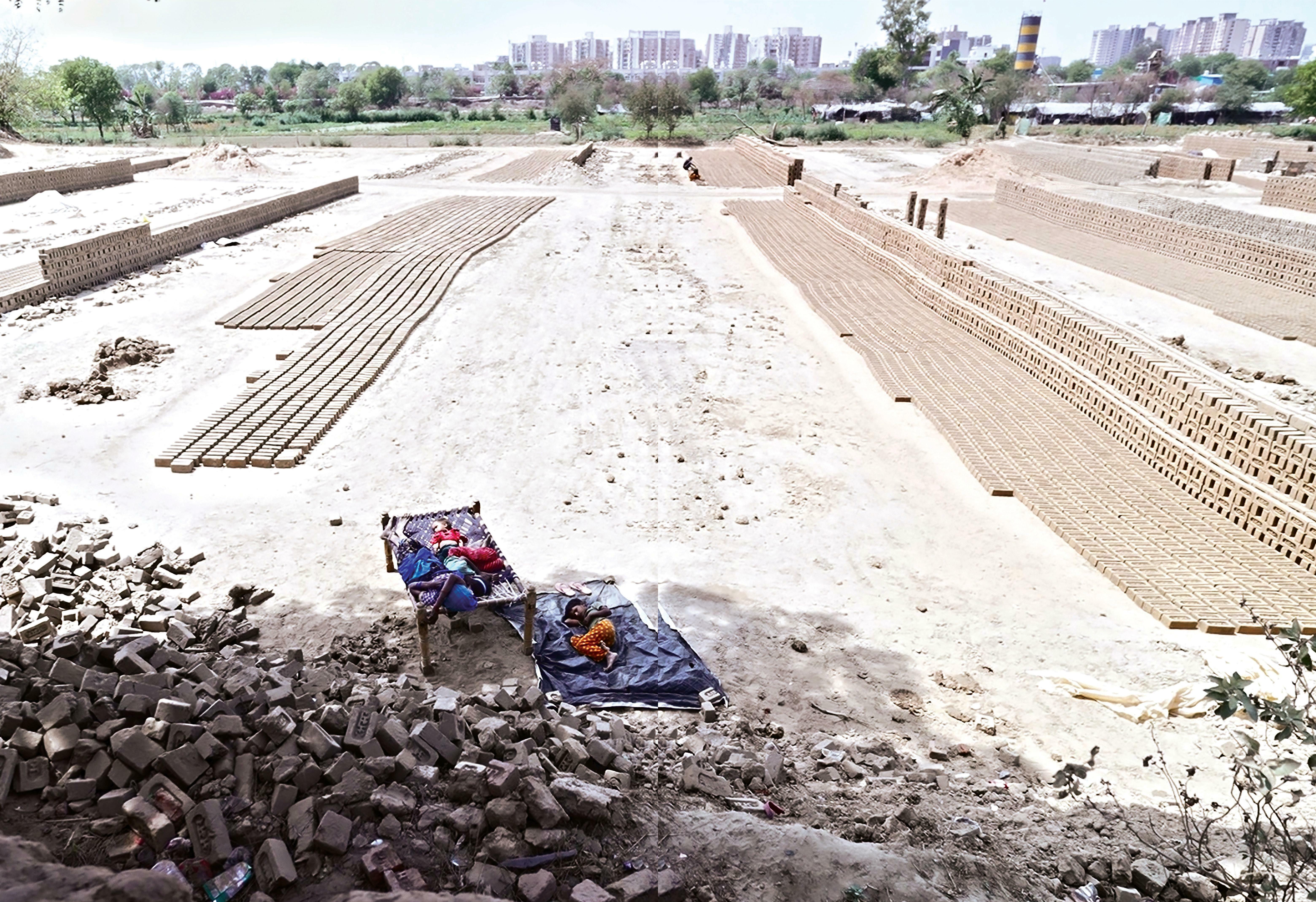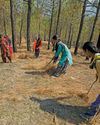
BIRESH KUMAR, a 38-year-old labourer, works at least six hours in the sun every day. Though it is only mid-April-early days of summer in north India-the afternoon temperatures hover around 38°C in Bhopani, the village in Haryana's Faridabad district where Kumar works at a brick kiln. When the summer peaks in May-June, the mercury will likely cross 40°C. "I feel like I'm trapped in a heat island. But I have to work to repay a debt I owe to the labour contractor," says Kumar.
Sitting on a cot under a tree at some distance is Kumar's co-worker Somveer. For the past two days, Somveer has had body ache, weakness and fever, which have forced him to miss work and, as a result, forego his wage. He does not know the reason for his condition, but says it could be due to constantly working under the sun. The National Institute for Occupational Safety and Health, US, recommends that those who work in the heat should consume 237 ml of water every 15-20 minutes. But for workers like Kumar and Somveer, that would mean more breaks and missed targets, resulting in a loss of wage. Neeraj Kaushik, medical officer in-charge at the government hospital in Kheri Kalan that Somveer and Biresh have access to, says he sees several labourers with complaints of fainting episodes. "They are weak and dehydrated, with severely chapped lips. If they have comorbidities, like diabetes, it becomes an emergency situation. If their vitals are weak, it takes a long time to resuscitate them," he says.
This story is from the {{IssueName}} edition of {{MagazineName}}.
Start your 7-day Magzter GOLD free trial to access thousands of curated premium stories, and 9,000+ magazines and newspapers.
Already a subscriber ? Sign In
This story is from the {{IssueName}} edition of {{MagazineName}}.
Start your 7-day Magzter GOLD free trial to access thousands of curated premium stories, and 9,000+ magazines and newspapers.
Already a subscriber? Sign In

THE CIRCULARITY ARGUMENT
A circular economy can help India achieve its developmental aspirations while following the low-carbon pathway. It will also help address the challenges of waste management, pollution and overexploitation of natural resources. Industries are already innovating to reuse high-volume wastes and have shown that the transition can usher in both environmental and financial windfalls

Banking on flawed drug voluntary licences
The Medicines Patent Pool is pushing for more VLs, but its bad deal with Novartis on a cancer drug shows the pitfalls

Lasting solutions
For the first time, the UN has recognised the role of indigenous communities in tackling aridity. A repository of traditional knowledge India has the wherewithal to lead the way

IMD at 150
India's journey into modern weather forecasting took a decisive turn 150 years ago with the establishment of India Meteorological Department during the British rule. The agency has come a long way since then, shaping the way the country predicts and responds to its diverse climate challenges

Every drop counts
In drought-prone Marathwada region, 14 villages have managed to counter water shortage by budgeting the resource

Threat to survival
Hollongapar Gibbon Sanctuary in Assam faces ecological challenges as railway electrification and hydrocarbon exploration endanger its fragile biodiversity

'Migration is going to be a battlefield'
AMITAV GHOSH is one of the foremost chroniclers of our times. His literary sojourn includes writings on topics that range from languages to climate change to human lives. His latest book, Wild Fictions, brings some of his works on these issues under one title. In a conversation with RAJAT GHAI, Ghosh shares his views on the future of human movement. Excerpts:

Face of future
California wildfires confirm forest fires are intensifying in a hotter world, emitting substantial amounts of greenhouse gases and reinforcing global warming

Friends of the forest
Residents of 30 villages in Uttarakhand establish a model for public participation in saving forests from wildfires

Climate-crazy playbook
Just hours after his second (and final) term began on January 20, US President Donald Trump unleashed 46 presidential actions. Several of these are centred on the US' climate commitments, energy transition, migration and trade policies, and are likely to have negative global implications